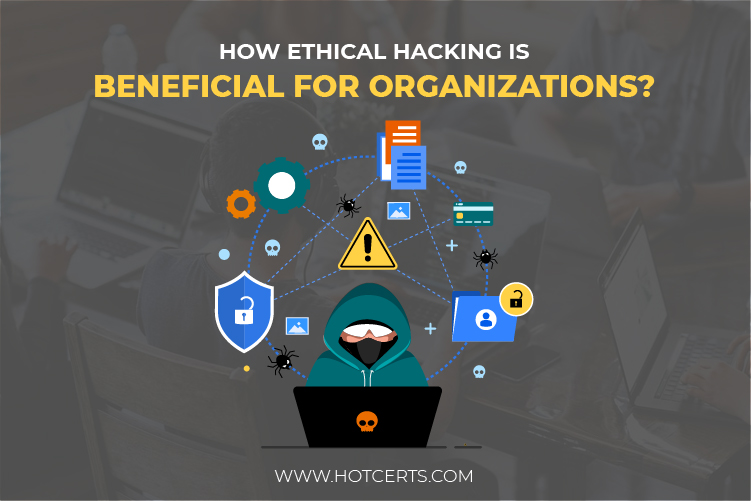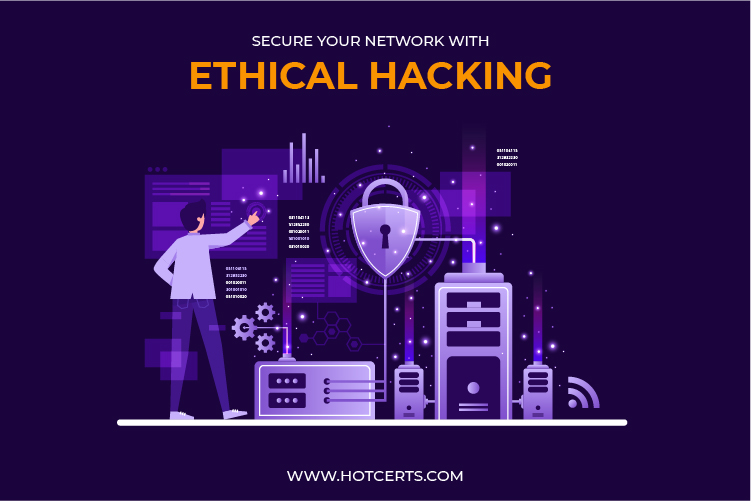Ethical Hacking: How is it beneficial for organizations?
What is Ethical Hacking?
The literal definition of the term “hacking” means finding vulnerabilities in system firewalls and gaining unauthorized access to exploit them to perform malicious activities. A hacker who can circumvent security can remove or steal sensitive information that could harm a company or individual. However, ethical hacking is a legal variation of hacking.
Enterprises hire computer experts to test system security, identify vulnerabilities, and analyze how to improve firewalls. It is also a way for government agencies to locate and identify potential threats to national security. Individuals who have permission to hack a computer system are called “ethical hackers.” They are certified to hack according to the client’s instructions. After the vulnerability is identified, the hacker presents a “maturity scorecard.” It shows the level of risk, the number of security loopholes and suggests improvements.
Conversely, there is much controversy on the topic of ethical hacking. Many believe that there is nothing “ethical” about hacking. However, with the rise of cybercrime, it is clear that organizations and governments need to ensure cybersecurity. It brings us the importance of ethical hacking and its use in the cyber world.
From coastal to coastal and in countries around the world, companies spend millions of dollars on IT time to keep hackers away from computers. Therefore, it may seem counterintuitive that some companies are welcoming hackers with open arms. It may seem strange, but companies use ethical hackers to identify weaknesses in cyber defenses, provide valuable insights into the behavior of unethical opponents, and make them better, stronger, and more resilient. We are building a robust network. If you don’t think hackers can help your business rather than hurt it, it’s a good idea to rethink those assumptions. Here are nine business benefits that ethical hackers can bring to your organization:
- Even if you have an IT background, it can be very difficult to get into the minds of hackers. Failure to understand what hackers think and want can be devastating to your business, and malicious people are ready to exploit your blind spots. They may be ethical in their actions, but white hat hackers know why they tick their less wise opponents. They understand how hackers work and can use that knowledge to protect their networks from intrusions.
- Each business network is surprisingly complex, with interconnected computers, mobile devices, teleworkers, and business travelers logged on from the road. When assessing cybersecurity, knowing what to look for is a real challenge, but ethical hackers start and where potential weaknesses may be hidden.
- You may think that your network is as secure as possible, but it may hide weaknesses you don’t know about. These weaknesses may not be visible to you, but experienced, ethical hackers will see them from a mile away. Finding hidden weaknesses in cyber defense is one of the biggest reasons to hire an ethical hacker. These good hackers are experts in finding open ports, backdoors, and other possible entry points into computer networks.
- Network testing and retesting are vital parts of successful cyber defense, but the success of a strategy depends on the tester’s skill. If people testing your network don’t know what to look for, it can result in false reassurance and catastrophic data breaches. Ethical hackers are second to none when it comes to network testing and intrusion detection. With years of experience investigating network weaknesses, we know how to perform tests and rely on the results’ accuracy.
- If you’re new to the business world, you can get ethical hackers to join your startup team to build a better, more robust network. Building a computer network with built-in security features greatly reduces the potential for breaches and data theft, and the benefits of adopting a white-hat hacker are significant. Members of the ethical hacker community look at networks of all kinds and understand how those systems need to be built. If you want to develop a fast, scalable, and hack-resistant network, these experts can help. Inviting hackers to your company may seem strange, but the right hackers can increase your organization’s security and your network.
- To prevent hacking, it’s essential to understand the hacker’s mindset. The traditional role in system security can do just that until you introduce the hacker mindset. The hacker’s approach is unique and challenging to handle in conventional system security roles. This sets up a case for hiring an ethical hacker who can access the system like a malicious hacker and discover security loopholes along the way.
- No system is completely unaffected by an attack. Still, organizations need to provide multidimensional protection. The ethical hacker paradigm adds an important aspect. A good example is a case study of a large organization in the manufacturing domain. Organizations knew the limitations of system security but couldn’t do much independently. So we hired an ethical hacker to assess the system’s security and provide findings and recommendations. The report consisted of the most vulnerable parts such as Microsoft RPC and remote management, system security improvement recommendations such as incident response systems, full vulnerability management programs, and more comprehensive enhancement guidelines.
- No matter how complex the system is, attacks are inevitable. Ultimately, the attacker discovers one or two vulnerabilities. This article has stated that cyber-attacks are unavoidable, regardless of how the system is enhanced. This does not mean that organizations should stop strengthening system security. Cyber attacks are evolving, and the only way to prevent or minimize damage is proper preparation. One way to prepare your system for an attack is to allow ethical hackers to identify vulnerabilities in advance.
- Penetration testing, also known as penetration testing, identifies system vulnerabilities that an attacker may target. There are many methods for penetration testing. Organizations may use different ways depending on their requirements.
- Targeted testing involves people and hackers in your organization. All staff in the organization know that hacking is taking place.
- Exterior testing infiltrates all externally exposed systems such as web servers and DNS.
- Internal testing reveals vulnerabilities exposed to internal users with access rights.
- Blind testing simulates an actual attack from a hacker.
Recruiting ethical hackers is a great way to test cyber defenses so that you can build a better and more secure corporate network. Both ethical hacking and traditional IT security need to work together to protect enterprise systems. However, companies need to develop strategies for ethical hacking. They can probably remove the leaves from the DHS policy for ethical hacking.
The role and scope of ethical hackers must be clearly defined. The company needs to check and balance so that hackers do not go beyond their job scope or damage the system. Companies also need to give ethical hackers a guarantee that no legal action will be taken in the event of a breach as defined in the contract.



